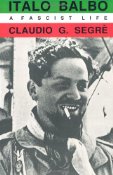
Italo Balbo, a Fascist Life
Fascism is a term most people have heard many times, but really don’t understand, except in that it conveys a sinister and dark meaning, being often associated with Hitler and Mussolini.  This reader knew more about National Socialism (Nazism) than about Fascism. This book explains something of the derivations and  basic tenets of the movement. The word fascism, is derived from the Italian word fascio which means bundle or union. It is a loose philosophy encompassing nationalistic and patriotic elements ruled by an elite class of propertied, or vested individuals.
According to this biography, Balbo was Fascist  because it suited his personality and desire to evince heroic characteristics and ultra patriotism, rather than due to any deep seated attachment to the finer points of a political belief. In later years, after the bloodless “march on Rome” that saw the Fascists come to power in Italy, Balbo became very disillusioned with the direction that Mussolini was taking the country and with the cult of personality cultivated by Il Duce’s dictatorship.
Balbo was the father of the Italian Air Force, and was world renowned for his aeronautical feats. In particular, Balbo made two transatlantic crossings with fleets of aircraft. These were huge logistical challenges at the time. This reviewer’s father has very clear memories of Balbo’s triumphant arrival in the US, and still speaks of Balbo admiringly. Balbo had a lot of swagger and panache. There is in fact, a street named after him in Chicago; 7th street became Balbo Drive.
Balbo’s popularity was such that Mussolini became concerned and virtually exiled him to Libya, where he became its territorial governor. On the whole, Balbo was admired and respected in Libya and made some significant accomplishments, including the construction of a coastal highway.
At the end of his short life, Balbo was an outspoken critic of Mussolini specifically concerning his alliance with Nazi Germany. Balbo opposed the racial laws that Mussolini pushed for at the behest of his German Ally. Although Balbo opposed Mussolini’s war plans, he felt it his patriotic duty to serve his country, however ill-fated the outcome.
Balbo’s opposition to Mussolini led many to speculate that his death was not the accident it actually was, and that Il Duce had him assassinated. The author gave pretty convincing evidence to the contrary. While Balbo was indeed the victim of friendly fire, he himself was somewhat to blame for not following defined procedure in making the proper approach in landing his plane.
The book was well researched and even-handed in its description. It neither waxed adulatory or negative in recounting the life of an interesting guy. He was certainly no saint, and engaged in thuggish behavior as a youth in the fascist movement. However, he was brave and daring and accomplished great feats. He stood up for what he believed and enjoyed tweaking Herman Goering when the latter made a visit to Libya. He constantly exposed Goering to Jewish artisans and at one point invited him to a dinner party with some prominent Jews. Goering diplomatically excused himself.
It’s difficult to understand what things were like 70-80 years ago, but this book did a pretty good job conveying a fair representation of Balbo’s life, times, and motivations. The author was meticulous in his research and fair in his exposition. It’s interesting to talk to someone who actually remembers some of the events from the 30’s depicted in the book. This reviewer’s father has a fond recollection of Balbo as a hero of sorts because he lived through those times.
The book closes with a quotation from one of Balbo’s rivals, who, while a bitter opponent at times, still admired him greatly. Ciano wrote:
“He had more dash than talent, more vivacity than acumen. He was a decent fellow, and even in political clashes, in which his partisan temperament delighted, he never descended to dishonorable and questionable expedients. Balbo’s memory will linger long among Italians because he was, above all, a true Italian, with the great faults and great virtues of our race.”
This quote pretty much sums up the tone and conclusions of the biography. Â It wasn’t riveting, but it was interesting.

 The posts are coming!
The posts are coming!


0 comments
Kick things off by filling out the form below.
Leave a Comment